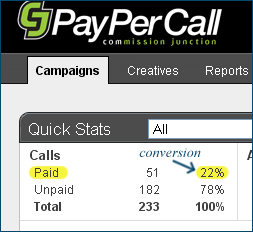 A month ago ShareASale published a brief case study on how the pay-per-call model was working for one given affiliate program, that of Legacy Learning Systems [view it in PDF here]. In it the program’s manager, Matt McWilliams, shared that in the first 30 days with the platform — ShareASale uses RingRevenue‘s technology to track their pay-per-call transactions (same platform that is being used by OfferMobi) — they received 200 calls, and “100% percent of the calls that qualified for an affiliate commission payout converted to a sale.” Needless to say, that such performance exceeded the merchant’s “ROI expectations”.
A month ago ShareASale published a brief case study on how the pay-per-call model was working for one given affiliate program, that of Legacy Learning Systems [view it in PDF here]. In it the program’s manager, Matt McWilliams, shared that in the first 30 days with the platform — ShareASale uses RingRevenue‘s technology to track their pay-per-call transactions (same platform that is being used by OfferMobi) — they received 200 calls, and “100% percent of the calls that qualified for an affiliate commission payout converted to a sale.” Needless to say, that such performance exceeded the merchant’s “ROI expectations”.
I am generally very skeptical of any case study that talks of amazing performance, or “the next big thing” of any kind. It was on this reason that unlike my fellow-bloggers Shawn Collins and Linda Buquet I have not given this particular case any coverage in my blog.
However, I did start monitoring PPCall performance very closely in one given affiliate program, that of HealthCompare.com. Their program is run on Commission Junction, which also works with RingRevenue to offer their merchants a way to start pay-per-call affiliate programs. After three weeks of precise monitoring, I must admit that I’ve been converted: from skepticism to a firm belief that there is a very bright future for pay-per-call affiliate programs.

The latest stats from the above-quoted affiliate program show that conversion fluctuates between 21% and 22% (see the above screenshot). This is 5.5 times better than this particular merchant’s regular online affiliate program, and some 10 times better than what is considered to be a solid conversion for affiliate programs overall.
If you aren’t using PPCall yet, I certainly recommend giving it a shot.
I have said it before and I will say it again here.
Using ShareASale’s Pay Per Call platform was the single best decision we made at Legacy.
Go LLS affiliates!
What makes a call “qualified for an affiliate commission” in your program, Matt. In HealthCompare.com’s program they pay for all calls that last 3 minutes or longer.
For us it is if the person presses [1] and lasts over 4 minutes.
This eliminates service calls (i.e. shipping questions, replacement discs, etc.) and we found that sales calls VERY rarely are under 4 minutes. Of course some calls that do not result in sales do last over 4 minutes, so it averages out in favor of the affiliates.
Great post, Geno. Thank you for taking the time to really look at the numbers. We’re glad to hear that you’re convinced!
@Matt: Thanks for this. This is very good information to have.
@Jason: I’m gonna email you soon.
My pleasure Geno! Feel free to ask anything else 🙂
Geno, I think you are going to see lots of good data coming out of PPCall very soon. Matt is a real pro and his work has really been great for helping everyone working with PPCall in understanding the opportunity better.
Durk,
Glad I could help and thanks for kind words.
I am definitely in the category of PPCall evangelist now. It’s great for everyone, affiliates and merchants!
Durk, are many of your clients using the PPCall model/programs?
Hey, Matt, so what call-to-commissionable call conversion are you registering?
It’s a little lower that we would like, but improving as we tweak it. About 10% right now. I think it can be as high as 25% with continued improvement though!
Gotcha, and thank you for this, Matt. Are you using dedicated landing pages for your PPCall program? Do you offer affiliate more than one to split-test their campaigns?
No on the dedicated pages, though some are in the works.
Same for the split-testing, but we test everything on our end and if two options are close, we will give them the option of both.
Understood. HealthCompare.com does both, and it really helps with those conversions.
Pingback: HealthCompare.com Conversion Rates Creating Pay-Per-Call Advocates
Hi Geno,
Your post and comments following it make for an interesting read. I’ve been reading about pay per call advertising a lot and would like to understand how is this product pitched as in the market – is it sold as a replacement of CPL programs and thus priced in comparison to a lead or is it being pitched as a product with higher quality than CPL and thus premium pricing on this?
Kunal, PPCall actually doesn’t have to be in competition with CPL or CPA, but works well complementing both. See this post and this interview for more details.
I completely agree that pay-per-call can yield a much higher ROI/conversion rate, but this is at the expense of call-volume (albeit using adwords search network).
I’ve had ROI’s of 50%+, and CR’s of 20-80%.
Is there an industry standard for what the pay per call management company keeps of the cost per call that advertisers pay? I’m sure the publishers get only a portion of the revenue.
The way it normally works, Lynn, publishers get the promised payouts, while the solution’s provider receives their pay either based on the number of calls, or publishers, or “telecom fees” of some sorts (on top of the publishers’ payouts), or a combination of all these.